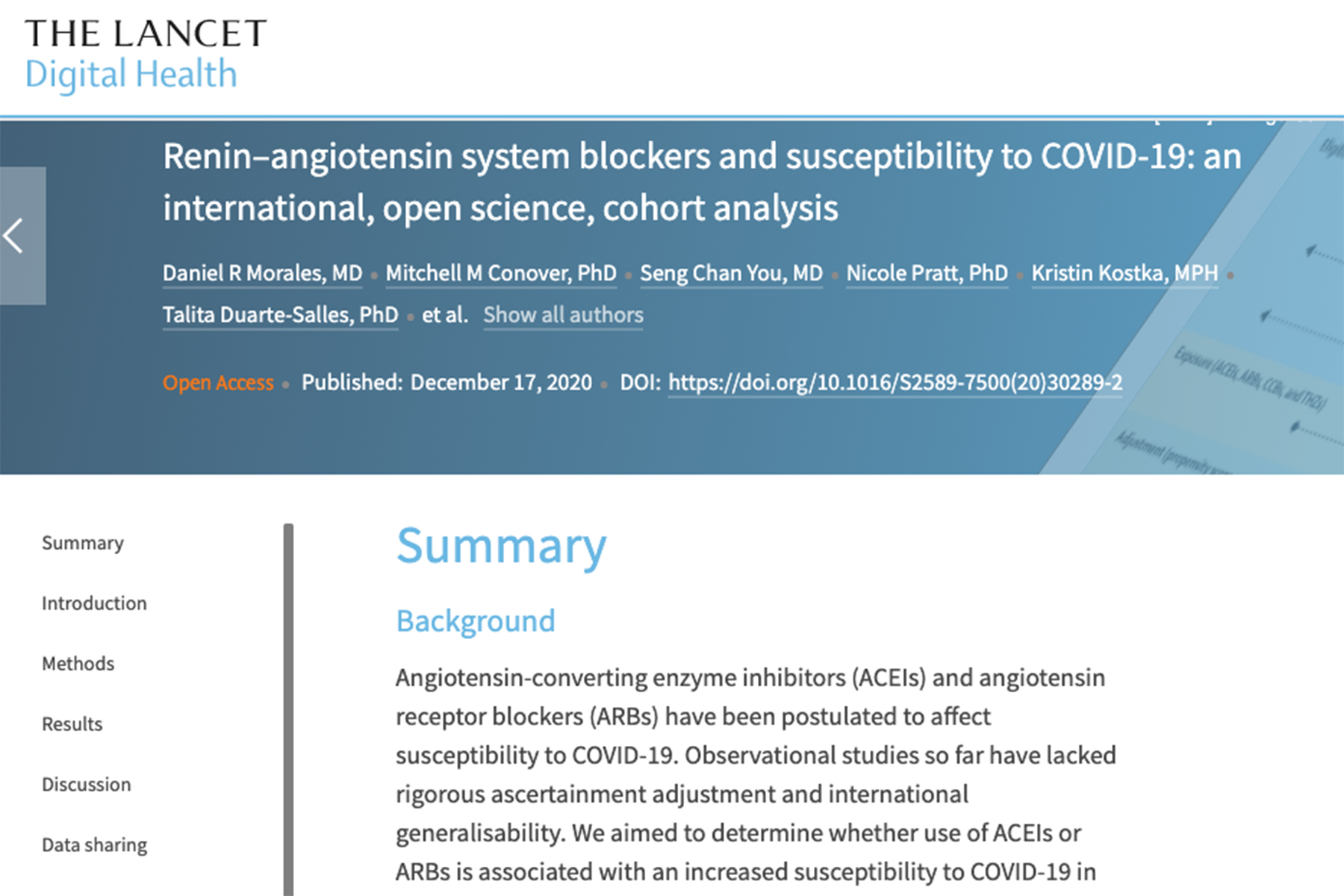World’s Largest Study on ACE Inhibitors, ARBs Shows No Increased Patient Risk of COVID-19 Diagnosis, Complications
 While the COVID-19 pandemic left the world searching for answers during the earliest stages of the pandemic, one immediate healthcare concern regarded the use of certain antihypertensives, and whether they posed increased risks to patients dealing with hypertension.
While the COVID-19 pandemic left the world searching for answers during the earliest stages of the pandemic, one immediate healthcare concern regarded the use of certain antihypertensives, and whether they posed increased risks to patients dealing with hypertension.
Evidence, generated by global collaborators within the Observational Health Data Sciences and Informatics (OHDSI) community and recently published in The Lancet Digital Health, found that there was no increased risk of COVID-19 diagnosis, hospitalization, or subsequent complications for users of either angiotensin-converting enzyme (ACE) inhibitors or angiotensin receptor blockers (ARBs) among an international cohort of more than 1.1 million patients using antihypertensives.
This real-world evidence, generated through open-science approaches, support recent regulatory and clinical recommendations that patients should not discontinue ACE inhibitor or ARB therapy due to concerns of increased COVID-19 risk.
“People with hypertension have worse COVID-19 outcomes, and there remains speculation that some anti-hypertensive medications may be detrimental,” says corresponding author Marc A. Suchard, a professor at UCLA and research team leader. “The clear answer is that ACE inhibitors and ARBs pose no increased risk as compared to other treatments.”
While other studies have generated similar findings recently, this study is the most comprehensive one to date of COVID-19 susceptibility risks for antihypertensive users. OHDSI researchers examined electronic health records from a trio of data sources from the United States and Spain (Columbia University Irving Medical Center, the Department of Veteran Affairs and the Information System for Research in Primary Care) to conduct a systematic cohort study of ACE, ARB, calcium channel blocker (CCB) and thiazide diuretic (THZ) users.
Furthermore, the findings showed no clinical reason to switch from an ARB to an ACE inhibitor to minimize COVID-19 risk.
“Based on our results, if there is a risk difference, it’s marginal and would be very challenging to further refine outside such a large-scale international study,” Suchard said.
Powered by open-source tools, state-of-the-art analytical methods and global collaboration within the OHDSI community, these findings provide robust and reproducible real-world evidence. The study design was specifically cited by the European Medicines Agency in the latest version of The European Network of Centres for Pharmacoepidemiology and Pharmacovigilance (ENCePP) Guide on Methodological Standards in Pharmacoepidemiology following its release on a preprint server:
Morales et al. supported the reproducibility of their study by publishing the study protocol in the EU PAS Register ahead of time, providing a start-to-finish executable code, facilitating the sharing and exploration of the complete result set with an interactive web application and asking clinicians and epidemiologists to perform a blinded evaluation of propensity score diagnostics for the treatment comparisons.
“By comparing people exposed to ACE inhibitor and ARBs against people taking other antihypertensives, either alone or in combination, using two methods across three database the study generated 1280 comparisons to assess the safety of these drugs, producing highly consistent results,” says lead author Daniel Morales, Wellcome Trust Clinical Research Fellow at the University of Dundee.
The International COVID-ACE Receptor Inhibition Utilization and Safety (ICARIUS) protocol, code, and results are all available for further exploration at https://github.com/ohdsi-studies/Covid19Icarius.
“Open science and collaboration are tenets of the OHDSI community, and they were never more important than early in this pandemic, when we all knew very little about critical questions like antihypertensive risks around COVID-19,” said George Hripcsak, Chair of the Columbia Department of Biomedical Informatics, the coordinating center for OHDSI, and a member of the Columbia Data Science Institute. “Our community collaborated for years to develop the high-level analytics which set the course for these studies, and our belief in international collaboration through open science allowed us to generate this reliable, reproducible COVID patient data that can inform and support critical decision-making to this and other issues challenging our healthcare community.”
OHDSI is a multi-stakeholder, interdisciplinary collaborative to bring out the value of health data through large-scale analytics. All solutions are open-source. OHDSI has established an international network of researchers and observational health databases with a central coordinating center housed at Columbia University.
About This Study
The study “Renin–angiotensin system blockers and susceptibility to COVID-19: an international, open science, cohort analysis” was published Dec. 17, 2020, in The Lancet Digital Health.


